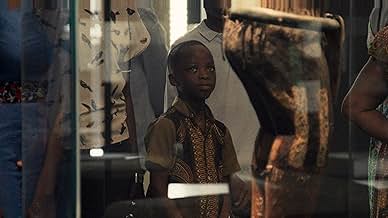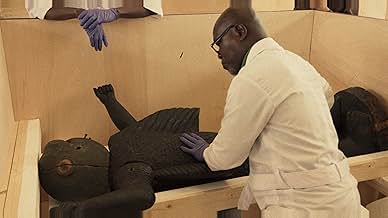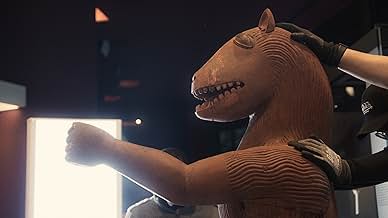Dahomey
- 2024
- 1 h 8 min
A jornada de 26 tesouros reais saqueados do Reino do Daomé exibidos em Paris, que agora estão sendo devolvidos ao Benin. O diretor Mati Diop expressa artisticamente as demandas de uma nova g... Ler tudoA jornada de 26 tesouros reais saqueados do Reino do Daomé exibidos em Paris, que agora estão sendo devolvidos ao Benin. O diretor Mati Diop expressa artisticamente as demandas de uma nova geração.A jornada de 26 tesouros reais saqueados do Reino do Daomé exibidos em Paris, que agora estão sendo devolvidos ao Benin. O diretor Mati Diop expressa artisticamente as demandas de uma nova geração.
- Direção
- Roteiristas
- Artistas
- Prêmios
- 13 vitórias e 50 indicações no total
- Voice
- (narração)
- Voice
- (narração)
- Voice
- (narração)
- Voice
- (narração)
- Direção
- Roteiristas
- Elenco e equipe completos
- Produção, bilheteria e muito mais no IMDbPro
Avaliações em destaque
Listening to Beninese talk about the significance of gaining these pieces back and all of the relics still in France was the meatiest part of this film and the most engaging for me. Often, I feel that a unsubstantial film could be edited for improvement. In this case, I feel that a lot of substance could have been added.
Diop's approach is interesting as it felt like a real-life poetry being at displayed. Filled with gorgeous sound designs, music, and interesting imagery choices to present, it's definitely a documentary that sheds a good light on it's way. Interconnected with poetic dialogue, it's slow and meditative approach creates an interesting experience.
It isn't a standard documentary as it's more of an experimental art piece of a movie at times. But it's definitely an interesting experience.
As a viewer from Europe, I felt a slight lack of explanation about what modern Benin is like beyond its capital, which would have helped form an opinion on the discussions presented by the Beninese in the film. However, it's clear that the filmmaker did not set out to provide a comprehensive overview of the country's current state.
The narrative use of "26," the artifact that serves as the story's guide, is one of Diop's masterstrokes. Giving a statue its own voice-imbued with a subjective and almost spiritual perspective-turns the narrative into something profoundly human and, paradoxically, otherworldly. The statue's low, wise voice leads us through its journey of displacement, capture, and eventual reconnection. When we see the world through "26's" eyes-like in the scene where light fades as it's packed into a box-we feel the symbolic weight of being stripped of one's roots and confined to a foreign space.
Diop's cinematography is another standout feature. She skillfully balances the grandeur of Benin's landscapes with intimate shots of hands touching, holding, and carrying the artifacts. Every movement captures not just the object itself but the emotional and spiritual bond between the people of Benin and their cultural heritage. This visual duality creates a rhythm that feels almost meditative, giving the audience time to reflect on the depth of loss these artifacts represent-and the powerful act of their return.
Yet "Dahomey" doesn't stop at celebrating restitution as a triumphant event. The film honestly and thoughtfully explores the conversations sparked within the community as the artifacts are brought back. The joy of their return is intertwined with deeper questions: What exactly was lost? Can the void left by centuries of cultural colonialism ever be filled? While some voices express optimism about reclaiming these objects, others question the impact on a history that has been fractured and reshaped by foreign hands. Diop wisely observes these discussions without passing judgment, allowing the viewer to absorb the layers of meaning embedded in every exchange.
At just 68 minutes, the film might leave some viewers feeling like there's more to uncover. The conversations are so rich that a deeper dive would have been welcome. Still, this brevity is part of "Dahomey's" impact: it leaves you wanting to continue the dialogue, both internally and with others. The film doesn't offer easy answers or definitive solutions. Instead, it invites ongoing reflection on the intersection of history, identity, and justice.
"Dahomey" is a brilliant example of how cinema can serve as a tool for resistance and reconstruction. Diop doesn't just document a historic moment-she transforms it into a sensory and intellectual experience that reverberates far beyond the screen. The pain of colonialism is palpable, but so is the hope for a more just future, where stolen stories can be reclaimed and retold by those to whom they truly belong. This is a film that demands attention, reflection, and, above all, action. A work of art that reminds us the fight for historical justice is both a collective and deeply personal act.
So a certain muppet in the user reviews said the movie is "overhyped" because a movie that lacks character development can never be a good movie. That's very derp.
So, I was scratching my head for a solid eight minutes, trying to figure out how he focused on character development in this pertikular docu about France repatriating artifacts from Dahomey. And I think I unpacked it. See what you think of my figuring. . . Thank you.
I reckon said usder-reviewer thought "Dahomey" us the a story about a homie, as in "The Homey" and so fully expected to see a movie about some homey's life journey. Or some exciting chapters in such a life and to be fair, that would be a story that demands character development from the git go. Frustrated expectations naturally led to a raw deal sorta disappointment.
Find out that "Dahomey" is actually a nation and all of that simply did not make up for the short fall, hence the windy, irrelevant remarks/review.
Then I was thinking, "Alrighty, had it be me who had no clue about the nation "Dahomey" and had watched the movie all bummed out and crest fallen, what would I do, besides writing an embarrassing review?
And the answer that came to me was ironic. I would watch the movie again. But I can imagine how that sounds like punishment in certain ears. My mom used to say, when she was still above ground, "The day you stop learning is the day you quit living."
Você sabia?
- CuriosidadesOfficial submission of Senegal for the 'Best International Feature Film' category of the 97th Academy Awards in 2025.
- Citações
[first lines]
Voice of Artifact #26: As far back as I can go, there has never been a night so deep and opaque. Here, it is the only possible reality. The beginning and the end. I journeyed so long in my mind but it was so dark in this foreign place that I lost myself in my dreams, becoming one with these walls. Cut off from the land of my birth as if I were dead. There are thousands of us in this night. We all bear the same scars. Uprooted. Ripped out. The spoils of massive plundering. Today, it's me they have chosen like their finest and most legitimate victim! They have named me 26. Not 24. Not 25. Not 30. Just 26.
Principais escolhas
Detalhes
Bilheteria
- Faturamento bruto nos EUA e Canadá
- US$ 100.959
- Fim de semana de estreia nos EUA e Canadá
- US$ 25.960
- 27 de out. de 2024
- Faturamento bruto mundial
- US$ 593.052
- Tempo de duração1 hora 8 minutos
- Cor
- Mixagem de som
- Proporção
- 1.78 : 1



















